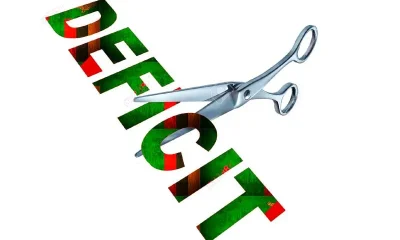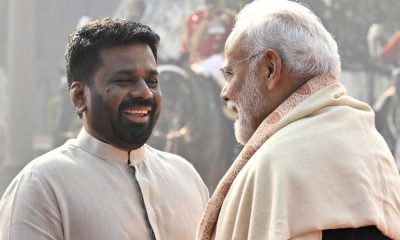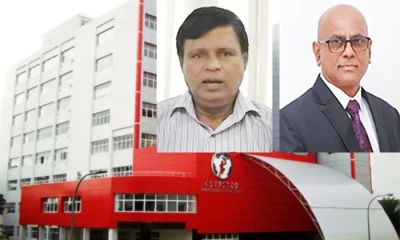Editorial
Any port in a storm

Friday 13th May, 2022
UNP Leader Ranil Wickremesinghe should consider having ‘Houdini’ as his middle name, given his adeptness at political escapology. His critics thought it was curtains for him when he and his party suffered an ignominious defeat at the 2020 general election, but a few months later he appeared in Parliament, grinning from ear to ear as if nothing had happened. Now, he is back at Temple Trees!
The appointment of Wickremesinghe as the Prime Minister is indicative of President Gotabaya Rajapaksa’s desperation vis-à-vis widespread protests seeking his ouster. Prime Minister Mahinda Rajapaksa, an elected MP, representing the SLPP, which won 145 seats, has resigned under duress, and Wickremesinghe, a defeated candidate, who entered Parliament via the National List, has succeeded him!
Wickremesinghe’s appointment is said to be consistent with the Constitution. What is constitutional may not necessarily be ethical or moral, but that is the way the cookie crumbles in politics.
The country was without a government for a few days owing to the resignation of PM Rajapaksa on Monday, and a new PM and a Cabinet had to be appointed. The SJB initially turned down President Rajapaksa’s invitation to join an interim administration. It insisted that the President had to step down. The JVP also said it would agree to form a caretaker government provided the President resigned forthwith and the Speaker was appointed President. The Election Commission (EC) has emphasised that no election should be held at this juncture, and the formation of an interim government to resolve the economic crisis and restore social order is the need of the hour. The Central Bank has warned that unless political stability is restored soon, economic recovery will be impossible. The President chose to appoint Wickremesinghe PM, and this move, in our book, could be considered political rabona.
It is doubtful whether the strategists of the SJB anticipated such a manoeuvre from a beleaguered President. Yesterday, Opposition and SJB leader Sajith Premadasa, softened his stance and expressed his willingness to accept the premiership. He may have sought to prevent some of his MPs from defecting. But it was too late.
Wickremesinghe’s appointment will have a devastating impact on the SJB, which will lose some of its MPs to the UNP. Power acts as a magnet for politicians—especially for those of easy virtue, as it were—and Parliament is full of turncoats. Politicians do not scruple to switch their allegiance and are even ready to sell their souls to the devil. Premadasa will have his work cut out to prevent defections from his party.
Curiously, while demanding President Rajapaksa’s resignation as a condition for its support for the proposed interim administration, the SJB called for the restoration of the 19th Amendment (19A). If 19A is re-introduced in the form of the proposed 21 Amendment, the President will be reduced to a figurehead overnight to all intents and purposes; he will not be able to hold any ministerial posts, and the Prime Minister will become the de facto Head of State, as we saw from 2015 to 2019, even though the transitional provisions allowed the then President Maithripala Sirisena to retain some executive powers and be a member of the Cabinet. So, the question is whether anyone will have to worry about the executive presidency in case of 19A being restored.
The biggest challenge before PM Wickremesinghe is to prove a local aphorism wrong—mole thiyankota bale ne, bale thiyanakota mole ne, or ‘when one has brains one has no power, and vice versa’. He is one of the few MPs who have been talking sense and acting sensibly in the current Parliament. Whether he will continue to do so, as the PM, and disprove the aforesaid adage remains to be seen.
Resistance has already emerged, in some quarters, to Wickremesinghe’s appointment. What the warring parties must not lose sight of is the rapid economic decline. They must listen to the Central Bank and Finance Ministry experts, who are struggling to save the economy, and calling for urgent measures to bring about political stability. The tumble of the rupee continues. Yesterday, it touched an all-time low of 380 per US dollar. This means more stress for the economy and suffering for the public; prices of all goods, especially imports including fuel, are bound to increase further. The situation will take a turn for the worse unless political stability is restored fast.
Let all those—politicians, trade unionists and others—who are in a perpetual state of agitation be urged to agree to a truce and help resuscitate the economy.
Editorial
Saving children from corporate greed

Saturday 4th January, 2025
The government has announced new restrictions on marketing food and beverages for children under the Food (Labelling & Advertising) Regulations 2022. A long-felt need has been fulfilled, but much more remains to be done, given the increasing incidence of obesity, diabetes, etc., among children. Food and beverage manufacturers stand accused of using excessive levels of sugar, salt, oil and food additives to catch them young.
The Ceylon Chamber of Commerce (CCC), has welcomed the new restrictions at issue. Its positive response can be considered the food and beverage industry’s willing compliance. Having helped the Ministry of Health during the consultation process, the CCC is of the view that under the new rules the industry must ensure that children under 12 are not featured in advertisements for food and beverage products and that such products are not advertised or promoted for children below 12 years without prior approval from the Ministry of Health. It says the updated food labelling requirements will empower consumers with essential information, including nutritional values and detailed ingredient lists to make informed food choices.
It is one thing to introduce regulations to protect the public but it is quite another to ensure their enforcement. This country is not short of rules and regulations aimed at preventing unethical and illegal practices the food and beverage industry has earned notoriety for, but the regulatory authorities act in such a way that one wonders whether they are concerned about consumer safety at all. Consumers of all ages are at risk. A young woman was rushed to hospital recently after ingesting a detergent she was mistakenly served instead of a bottled soft drink at a restaurant in Pettah. A police investigation revealed that the restaurant staff had used soft drink bottles to store the surfactant!
The health authorities should go beyond adopting measures such as mandatory labelling and restrictions on advertising to ensure consumer safety. The food and beverage industry must not be allowed to use labelling as a caveat emptor to market products that are harmful to consumers’ health. Action must be taken to remove such products from the market to protect unsuspecting consumers who often overlook the fine print on food and beverage labels.
It is not prudent to expect all food and beverage manufacturers to be truthful in respect of what is mentioned in the labels on their products. Hence the need for random testing besides stringent laws to deal with those who provide misleading or false information to consumers.
There are many products sans labels for sale and how do the health authorities propose to ensure that they conform to the food and beverage safety regulations? Fast food outlets are apparently without any regulation across the country. There is nobody to check the levels of oil and additives in food items they sell, especially fried rice and koththu roti.
A successful campaign to ensure that food and beverages conform to stipulated standards will go a long way towards preventing noncommunicable diseases this country is plagued by and reducing state health expenditure.
Editorial
Bribe-gate and other unsolved plots

Friday 3rd January, 2025
A Washington Post report that in January 2024, India’s premier intelligence agency, the Research and Analysis Wing (RAW), began discreet discussions with some Maldivian Opposition politicians to explore the possibility of impeaching President Mohamed Muizzu has created quite a stir in diplomatic and political circles. Citing a document titled ‘Democratic Renewal Initiative’, The Washington Post has claimed that the Maldivian Opposition wanted to bribe 40 MPs including some members of Muizzu’s own party, and 10 senior army and police officers. It has said the plotters failed to gather enough votes to impeach Muizzu, and India did not pursue or finance the bid to oust him. The Maldivian Opposition has denied The Washington Post report, and the reaction of the Indian government was not known at the time of writing.
It has also been alleged that the ruling party in the Maldives engineered defections from the Opposition to thwart the impeachment bid.
Whether The Washington Post report is accurate one may not know, but it has shed light on the vulnerability of smaller states caught up in Great Power rivalry and facing a strategic dilemma. It has also reminded us of a similar allegation former President Mahinda Rajapaksa made following his defeat in the 2015 presidential race. In March 2015, he told The Hindu, that the RAW had conspired with the CIA and MI-6 to rally the Opposition under Maithripala Sirisena’s leadership against his presidency.
Anura Kumara Dissanayake, as an Opposition MP, told Parliament in October 2015 that Jaffna had become ‘a den of RAW spies’ on a mission to destabilise the North. He declared that foreign interference in domestic affairs was detrimental to Sri Lanka’s national interest.
The alleged attempt to bribe the Maldivian MPs including the ruling party members and countermoves evoke one’s memories of a foreign-backed move to bring down a Sri Lankan government by bribing MPs about 17 years ago.
In 2007, following an abortive attempt by the then Opposition to defeat Budget 2008 presented by the Mahinda Rajapaksa government at the height of the Eelam War IV, Dullas Alahapperuma, who was a minister at the time, disclosed at a media briefing that some MPs of the ruling UPFA had been bribed to vote against the budget, as part of a conspiracy to topple the government and derail the war; they had been found in five-star hotels with foreign prostitutes, Alahapperuma said, claiming that the government had fought quite a battle to prevent them from doing what they had taken bribes for. The Rajapaksa government managed to win the budget vote. Alahapperuma stopped short of revealing how that task had been accomplished, but there is reason to believe that the Rajapaksas outbribed their opponents.
Interestingly, on the eve of the 2007 budget vote, an influential western diplomat went in a tuk-tuk, under the cover of night, to a UNP MP’s house in Battaramulla, where a discussion was held on how to defeat the budget. This newspaper reported on his abortive nocturnal mission.
On 21 March 2024, the then Speaker Mahinda Yapa Abeywardena revealed in Parliament that he had been pressured by some foreign powers to take over the executive presidency in violation of the Constitution, at the height of Aragalaya, following President Gotabaya Rajapaksa’s resignation, in 2022. Their intention had been to create, in this country, a situation similar to that in Libya or Afghanistan, Abeywardena said, disclosing that they had gone to the extent of intimidating him when he refused to do their bidding. Some religious leaders were also among those who had exerted pressure on him to take over the presidency, he said. That damning revelation should have prompted the SLPP government to order a high-level probe.
The JVP-led NPP government has chosen to ignore Abeywardena’s aforesaid statement in Parliament. The Opposition, which makes a song and dance about even trivial matters, has also remained silent on this serious issue.
Let the self-proclaimed patriots in the government and the Opposition be urged to have Abeywardena’s claim investigated. As the Executive President, Dissanayake is now in a position to order a thorough probe into the alleged foreign interference in Sri Lanka’s internal affairs during Aragalaya.
Editorial
Messages and subtexts

Thursday 2nd January, 2025
New Year messages are usually run-of-the-mill statements which say very little in many words. But the one President Anura Kumara Dissanayake has issued for 2025 can be considered different; it sounds like a mini policy statement. He has highlighted his government’s primary development goals, which include the eradication of rural poverty, the implementation of the ‘Clean Sri Lanka’ initiative and the building of a digital economy. The President has also said in his message that his signature project, ‘Clean Sri Lanka’, whose launch coincided with the dawn of 2025, ‘aims to uplift society to greater heights through social, environmental, and ethical revival’. At the inauguration of ‘Clean Sri Lanka’ yesterday in Colombo, the President said the initiative would go beyond a mere environmental clean-up, and it aspired to ‘restore deeply eroded social and environmental fabric of the country’, and the government’s aim was to ‘create cleanliness and rejuvenation across all sectors of society’.
It is only natural that the eradication of rural poverty figures high on the JVP-led NPP government’s list of priorities. The JVP’s support base has been predominantly rural, and its expansion to urban areas to the extent of improving its electoral performance significantly occurred after the formation of the NPP coalition. More than 80% of Sri Lankans live in the rural sector, which is also home to about 80% of the country’s poor, and therefore, the government’s efforts to eradicate rural poverty make economic and political sense. Why the NPP administration is keen to build a digital economy is also understandable. Previous governments only paid lip service to the digitalisation of the economy, and that is one of the main reasons why this country has been lagging behind many other developing nations.
Everything about Sri Lanka’s economy is antiquated and looks like a relic from a bygone era. An analogue economy is an anachronism in today’s digital world, where e-commerce, the use of big data for decision-making, digital currencies, the integration of AI in business processes, automation, etc., have become the order of the day. It is heartening that President Dissanayake has undertaken to digitalise the economy as a national priority.
The government’s efforts to achieve the upliftment of society through social and environmental revival also deserve public support. However, the reference in President Dissanayake’s New Year message to ‘ethical revival’, which is also emphasised by other NPP leaders at various fora, is intriguing. It reminds us of President Gotabaya Rajapaksa’s policy statement presented at the inauguration of the Fourth Session of the 8th Parliament in January 2020. He said among other things: “One of our main themes during the last election was the development of a virtuous, law-abiding and disciplined society. The public has given us a mandate for this purpose.” The people believed in Gotabaya’s pledge to bring order out of chaos that the UNP-led Yahapalana government had plunged the country into, and elected him President in 2019 because they considered him a stickler for discipline. Most of those who backed Gotabaya and the SLPP switched their allegiance to Dissanayake and the NPP subsequently.
After the 2019 regime change, the then Opposition including the NPP accused the SLPP government of trying to position itself as the guardian of morals and enforce discipline on the people by decree. Using his military background to bolster their claim, some of them asked whether Sri Lanka was becoming a country like ‘Oceania’ ruled by Big Brother in Orwell’s novel, ‘1984’, where the Thought Police play a crucial role in ensuring compliance. Such questions are bound to be asked about ‘Clean Sri Lanka’ due to some NPP stalwarts’ frequent streams of invectives against the public service. Their hostile campaign is considered part of the NPP’s strategy to tame the public officials who are not willing to subjugate their professional independence and integrity to the government’s political agenda.
The government is apparently on a campaign to make the public service out to be Sri Lanka’s Augean Stables, and its task will be easy because the people are resentful towards state employees. Hercules diverted two rivers through King Augeas’ filthy stables to clean them, but the NPP government is waiting for a tsunami to flush Sri Lanka’s Augean Stables. Minister K. D. Lal Kantha has warned that the public service will be hit by a ‘tsunami’ similar to the one that helped clean Parliament.
Let’s hope that the ‘tsunami’ the NPP bigwigs are talking about will not turn out to be a socialist version of McCarthyism, which led to the repression and persecution of the left-wing individuals in the US about seven decades ago. Sri Lanka is no stranger to witch-hunts against public officials and others after regime changes.
-

 Features5 days ago
Features5 days agoThe recovery has begun
-

 Business6 days ago
Business6 days agoSri Lanka budget deficit decreased by Rs. 487 bn in first 10 months of 2024
-

 News6 days ago
News6 days agoSita Ratwatte passes away
-

 Business6 days ago
Business6 days agoDigital marketing in high gear to increase tourist arrivals to Sri Lanka
-

 Editorial6 days ago
Editorial6 days agoFlashbacks to war
-

 Features4 days ago
Features4 days agoAKD faces challenging year ahead
-

 Editorial5 days ago
Editorial5 days agoBashing bureaucrats
-

 News5 days ago
News5 days agoFM circular violated, Rs. 4 bn paid to CPC workers











